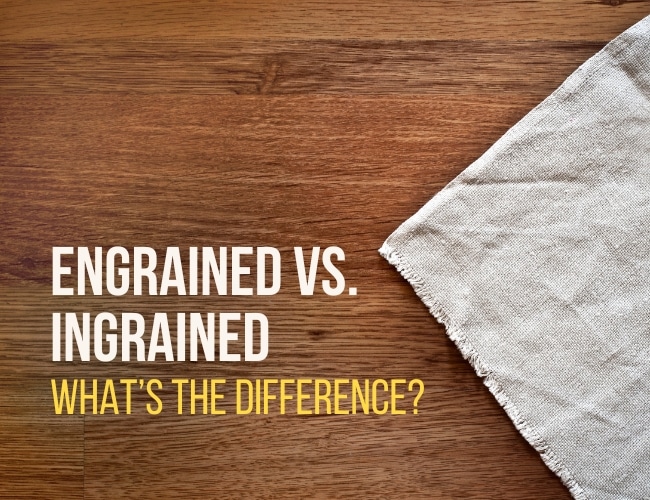If you've ever typed out a word only to hit delete and try it another way, you've likely been worried about making a spelling mistake. Take engrained vs. ingrained, what's the difference? Is only one correct? Let's take a look.

Engrained vs. Ingrained
“A man must be a great fool who can’t spell a word more than one way.”
That quote about English spelling, which has been attributed to several different people, including Mark Twain and Andrew Jackson, applies to engrained and ingrained. You can spell the word more than one way. Other pairs of en-/in- words (like ensure vs. insure and enquire vs. inquire) have different meanings or nuances, but these two do not. Engrained and ingrained are simply variants of one another, with ingrained being more common.
Engrain Definition and Common Use
Engrained comes from the verb “to engrain” and means to be firmly fixed and unlikely or difficult to change. The term originated with the idea of working dye into the grain or fabric of material. The Online Etymological Dictionary tells us that this meaning dates to the late 1300s. Today, though, we use engrain more often in the figurative or extended sense of habits, attitudes, thoughts, practices, etc. that are deep-seated and established over time. If something is engrained, it has been around for a while, at least for years and possibly for decades, generations, or centuries.
In addition, we encounter the word primarily in the passive voice or as an adjective. Certain ways of viewing the world have been engrained in us by our parents, teachers, the media, and our friends. Today’s political climate often represents a clash between engrained attitudes toward people who do not share our culture or values.
Ingrain Definition and Common Use
Everything we just said about engrained is true of ingrained. It is important to note, however, that ingrained is by far the more common spelling, especially in American English. Ingrained should become ingrained in your mind as the correct spelling in American English.
Examples Of Engrained vs. Ingrained
Examples of Engrain In A Sentence
“Being the head coach at Mississippi State is the opportunity of a lifetime. My family and I are fired up to engrain ourselves in this community, build relationships with our players, and hit the recruiting trail.” — Jeff Lebby, AP News
“Indian Guides, he said, is one of several nationwide children’s programs that are ‘literally incubators. They take the minds of children and engrain superficial images of the Indian people, like we don’t exist anymore. It victimizes all children.'” LA Times
“Stories are also multifarious and permeate all aspects of our lives. News, history, gossip, daydreaming. All involve a story. In this essay, I wish to explore the origin of storytelling and try to arrive at a conclusion as to why, as a species, we have such an ingrained impulse to tell stories and narrativise our lives.” Sam Woolfe
Her German teacher had engrained into students the habit of writing the date as day-month-year through the class's daily Calendar Talks.
Examples of Ingrain In A Sentence
Ingrained habits are hard to break, but that doesn't stop people who try to change their daily routine come January 1.
He has an ingrained sense of confidence in himself that makes him feel invincible.
“Military affairs in Colorado Springs are ingrained in every part of the region’s foundation.” Colorado Springs Chamber EDC
“We aspire to create an inclusive culture where every team member, patient and family member feels safe and valued. This philosophy is ingrained in every aspect of our organization.” Children’s Hospital Colorado
“It is, by definition, impossible to recognize your own ingrained patterns without being open to outside input and having the desire to develop self-awareness.” Psychology Today
“Brucco nodded, the scowl permanently ingrained now on his hawklike face.”The Ethical Engineer, Harry Harrison
No amount of scrubbing would remove the ingrained grease and grime from his fingers. His career as a mechanic had marked him for life.
Engrained vs. Ingrained: Which is Right for You?
If you use American English in your writing, the choice is simple: stick with ingrained. Ingrained is by far the more common spelling. In British English, engrained will raise fewer eyebrows and hackles than in American English, but you will never be wrong writing ingrained. For once, though, the choice is entirely yours—unless you are a student or writing for a company. Then you should ask which spelling they prefer, but both are correct and mean the same thing.
Isn’t the English language fun?
Which one do you tend to see more often, engrain or ingrain? Share in the comments.
PRACTICE
Now it's your turn—practice is ingrained in our process here after all. Write for fifteen minutes about ingrained ideas, attitudes, thoughts for the figurative sense or ingrained dirt in the literal sense. Use either ingrained or engrained.
Share your practice in the Pro Practice Workshop and leave feedback for a few other writers too.

Robert Harrell
Robert Harrell is a grammar nerd—and a language teacher, medieval re-creationist, musician, traveler, and theologian. His interests inform his stories and coaching. Published in German, Spanish, and French, with two English-language YA/NA series underway, Robert is pursuing The Write Practice Book Coach Certification to help other writers excel. Learn more at his website.



0 Comments